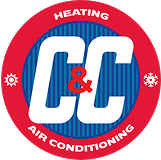If you’re shopping for a new HVAC system in Roseville, MI, you’ve likely encountered heat pumps in your search. And no doubt, whoever introduced them to you extolled their virtues, including energy efficiency and environmental benefits. However, you may not know exactly how and why heat pumps achieve those benefits. So, here’s an overview of how heat pumps impact the environment. By the end, you’ll understand exactly why heat pumps are an excellent choice for the environmentally conscious homeowner.
Heat Pumps and CO2 Emissions
One of the biggest environmental benefits of heat pumps is that they operate exclusively on electricity. That’s a major shift when compared to the current most popular type of heating equipment, which is the gas furnace. Gas furnaces are the dominant type of heating system here in Michigan, with 74% of homes relying on one. Unfortunately, burning natural gas for heat comes with a staggering environmental cost. The average house in a cold-weather state like ours emits over 8,000 pounds of CO2 every year from its furnace. By contrast, using electrical resistance heating as a primary heat source would ordinarily result in 9,900 pounds of CO2 emissions.
Heat pumps, however, substantially reduce household CO2 emissions compared to those other options. The secret is their amazing energy efficiency. In ideal conditions, a heat pump can achieve a coefficient of performance (COP) of up to 4. That means they provide four units of heat for every unit of electricity they consume. On average, though, a cold climate heat pump will hover at a COP of 2 during a winter here. That’s a big deal when you consider that conventional electrical resistance heating has a COP of 1. In other words, a heat pump can cut your household’s average heating-related CO2 emissions to around 4,950 pounds per year. That’s a more than 38% emission reduction compared to a gas furnace.
Better still, you can reduce your emissions with a heat pump even more by pairing it with renewable energy. And there are two ways you can do it. The simplest way is to choose an electricity provider that commits to 100% renewable energy. By doing that, you eliminate almost all of the CO2 emissions associated with running your heat pump. Or, as an alternative, you can invest in a solar power system for your house. That can not only cut your heating CO2 emissions to nearly zero but slash your heat-related energy expenditures, too.
It’s worth pointing out that there’s no way to reduce the CO2 emissions of a gas furnace. And, if you tried to use electric resistance heating instead, the energy costs would be unsustainable. As a result, heat pumps offer an affordable, environmentally friendly heating option with no equal.
Heat Pump Refrigerants and the Environment
The emissions tied to electrical generation aren’t the only source of emissions related to heat pump use, however. This is because heat pumps rely on refrigerants to operate. And those refrigerants can be far more harmful to the environment than CO2 if released. Unfortunately, this isn’t a new problem. It’s one that’s plagued the environment for decades.
The most well-known example of the environmental harm caused by refrigerants is Freon. Also known as R-22, Freon was once the most-used refrigerant in the world. Invented in 1928, it eventually became part of almost every air conditioner, refrigerator, and countless aerosols. It also wreaked havoc on Earth’s ozone layer and was 1,810 times more potent than CO2 as a greenhouse gas. Those downsides led to the phase-out of R-22 and a complete ban on its production import beginning in 2020.
Today’s heat pumps, however, use a refrigerant known as R-410a. It poses no threat to the Earth’s ozone layer. However, it’s 2,088 times more potent than CO2 as a greenhouse gas. That means heat pump manufacturers have to create durable refrigerant systems to contain it. The good news is modern heat pumps do an excellent job of minimizing refrigerant leaks while operating. According to the Environmental Protection Agency (EPA), the average heat pump has an annual leak rate between 1% and 4%.
As a result, the EPA estimates that a heat pump surrenders approximately 3% of its emissions advantage via refrigerant loss. That still makes heat pumps the obvious choice compared to all other heating options on the market. Plus, heat pump manufacturers are already moving away from R-410a to further reduce emissions.
Today, there are two major refrigerant options replacing R-410a in new heat pumps. One is R-32, which is 675 times more potent than CO2 as a greenhouse gas. Another is R-454b, which is only 466 times more potent than CO2 as a greenhouse gas. There are already heat pumps on the market that use these next-generation refrigerants. However, you’ll need to check any heat pump model you’re considering to see which refrigerant it uses.
Heat Pumps and Noise Pollution
Finally, it’s worth examining potential noise pollution issues associated with heat pumps. This is because older heat pumps had a reputation for being noisier than their conventional HVAC counterparts. Fortunately, that’s no longer true. Today, the outdoor unit of the typical conventional HVAC system operates at between 50 dB and 60 dB. That’s about as loud as a normal conversation. Most heat pump outdoor units operate within that same noise range. However, some are substantially quieter than that.
For example, if you install a ductless mini-split heat pump system, you can expect a far quieter outdoor unit. Some ductless mini-splits feature outdoor units that emit as little as 30 dB of noise while running. That’s about as quiet as your average library. Such systems make an excellent choice if you’re worried about noise. Plus, the indoor units on the average mini-split are even quieter than most central, forced-air HVAC systems. That’s because most operate using variable-speed motors. This allows such systems to run only as fast as your heating or cooling needs demand. You can also choose a multi-stage central heat pump system, which offers similar performance and quiet operation.
Your Local Heat Pump Experts
Now that you know all the environmental benefits offered by heat pumps, choosing one is a no-brainer. And if you’re looking for a heat pump in Roseville, C & C Heating & Air Conditioning can help. We offer complete HVAC services, including installation, maintenance, and repair. We even sell and service the latest ductless mini-split heat pump systems. We offer HVAC systems from Carrier, Trane, and Lennox, three of the most respected names in the HVAC industry. Our team of HVAC technicians is NATE-certified, and our firm is EPA-certified.
We offer ductwork services, indoor air quality services, and water heaters as well. With over 64,500 positive customer reviews and a 100% satisfaction guarantee, you can’t go wrong with C & C Heating & Air Conditioning. We also offer financing on approved credit if you need help paying for the new heat pump you want. So, if you want an environmentally friendly heat pump installed in Roseville, contact C & C Heating & Air Conditioning today!






